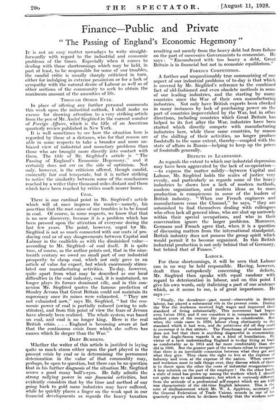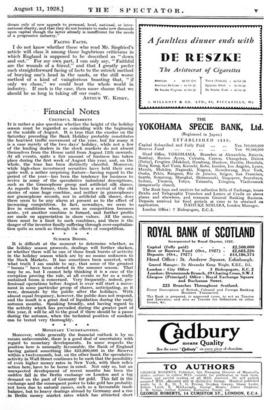Finance—Public and Private
" The Passing of England's Economic Hegemony "
IT is not an easy. matter nowadays to write straight- forwardly with regard to the industrial and economic problems of the times. Especially when it comes to dealing with those shortcomings which may be held, in part at least, to be responsible for some of our troubles, the candid critic is usually sharply criticized in turn, either for indulging in extreme pessimism or for a lack of sympathy with the natural desire of Labour as well as of other sections of the community to seek to obtain the maximum amount of the amenities of life.
THROUGH OTHER EYES.
In place of offering any further personal comments this week upon the industrial outlook, I shall make no excuse for drawing attention to a very striking article from the pen of Mr. Andre Siegfried in the current number of Foreign Affairs, which is the title of an American quarterly review published in New York. It is well sometimes to see how the situation here is regarded by those at a distance, who for that reason are able in some respects to take a broader and more un- biased view of industrial and monetary problems than those who are brought more directly into contact with them. The title of Mr. Siegfried's article is " The Passing of England's Economic Hegemony," and it certainly does not err on the side of optimism. Not only, however, is the criticism offered, though candid, eminently fair and temperate, but it is rather striking to notice the similarity between some of the conclusions reached by a writer three thousand miles distant and those which have been reached by critics much nearer home.
COAL.
There is one cardinal point in Mr. Siegfried's article which will at once impress the reader—namely, his assertion that the root cause of our troubles is to be found in coal. Of course, in some respects, we know that that is no new discovery, because it is a problem which has been pressed upon the attention of everyone during the last few years. The point, however, urged by Mr. Siegfried is not so much connected with our costs of pro ducing coal or of any disagreements between Capital and Labour in the coalfields as with the diminished value— according to Mr. Siegfried—of coal itself. It is quite true, of course, as the author points out, that in the nine- teenth century we owed no small part of our industrial prosperity to cheap coal, which not only gave us an article of value for export, but which enormously stimu- lated our manufacturing activities. To-day, however, quite apart from what may be described as our local difficulties in the coal industry, coal, it is maintained, no longer plays its former dominant role, and in this con- nexion Mr. Siegfried quotes the famous prediction of Stanley Jevons that Great Britain could not maintain its supremacy once its mines were exhausted. " They are not exhausted now," says Mr. Siegfried, " but the eco- nomic power of coal is partially reduced (owing to sub- stitutes), and from this point of view the fears of Jevons have already been realized. The whole system was based on coal, and coal is no longer king. Here is the real British crisis. . . . England is becoming aware at last that the continuous crisis from which she suffers has causes which lie deeper than the War."
DEBT BURDENS.
Whether the writer of this article is justified in laying quite so much stress either upon the part played in the present crisis by coal or in determining the permanent deterioration in the value of that commodity may, perhaps, be open to question, but there can be no question that in his further diagnosis of the situation Mr. Siegfried scores a good many bull's-eyes. He fully admits the strong rallying power in our financial activities, but evidently considers that by the time and method of our going back to gold some industries may have suffered, while he quickly places a finger on the weak spot in our financial developments as regards the heavy taxation resulting not merely from the heavy debt but from failure on the part of successive Governments to economize. He says : Encumbered with too heavy a debt, Great Britain is in financial but not in economic equilibrium."
FOREIGN COMPETITION.
A further and unquestionably true summarizing of one aspect of our industrial problems of to-day is that which is covered by Mr. Siegfried's reference to the combined fact of old-fashioned and even obsolete methods in some of our leading industries, and the starting by many countries since the War of their own manufacturing industries. Not only have British exports been checked in many instances by lack of purchasing power on the part of countries impoverished by the War, but in other directions, including countries which Great Britain has helped to its feet after the War, industries have been started which directly compete with manufacturing industries here, while these same countries, by reason of the shifting of their activities, no longer produce foodstuffs to the same extent, thereby—coupled with the state of affairs in Russia—helping to keep up the prices of foodstuffs generally.
DEFECTS IN LEADERSHIP.
As regards the extent to which our industrial depression may have been aggravated by the lack of co-operation- -to express the matter mildly—bgtween Capital and Labour, Mr. Siegfried holds the scales of justice very evenly, and particularly as regards some of the heavy industries he shows how a lack of modern methods, modern organization, and modern ideas as to mass production is conspicuous in some of the leaders of British industry. " When our French engineers and manufacturers cross the Channel," he says, " they are astonished to find themselves dealing with colleagues who often lack all general ideas, who are shut up narrowly within their special occupations, and who in their conversation ignore the larger problems. Moreover, Germans and French agree that, when it is a question of discussing matters from the international standpoint, British industry does not possess the group spirit which would permit it to become organized. In this British industrial production is not only behind that of Germany, but behind that of France."
LABoua.
For these shortcomings, it will be seen that Labour can in no way be held responsible. Having, however, dealt thus outspokenly concerning the defects, Mr. Siegfried then speaks with equal candour with regard to deterioration in labour, and on this point I give his own words, only italicizing a part of one sentence which, as it seems to me, is of great importance. He says :- " Finally, the decadence—part moral—observable in British labour, has played a substantial role in the present crisis. During the War the workmen received high wages and improved their standard of living substantially. This movement had begun even before 1914, and if one considers it in comparison with the earliest years of the century the progress is considerable. But when the crisis came in 1920, labour clung obstinately to the standard which it had won, and the politicians did all they could to encourage it in that attitude. The Frenchman of modest income does not feel that there is anything disgraceful in economizing, but the Anglo-Saxon regards it as a kmd of humiliation. By virtue of a tacit understanding England is to-day living at least as comfortably as in 1914 and far more comfortably than she did in 1900. But the greater part of the workers refuse 1,o recognize that there is an inevitable connexion between what they get and what they giye.- They claim the right to live at the expense of industry and even at the expense of the nation. When owners and workmen meet to talk things over, they discuss which of them is to throw upon the other the costs of industrial reorganization. A lazy solution on the part of the employer ! On the other hand, a state of mind has grown up among the workers which I should not quite dare to call mendicancy, but which is curiously different from the attitude of a professional self-respect which we are told was characteristic of the old-time English labourer. This is the note of disillusionment which Mr. W. A. Appleton, secretary Of the General Federation of Trade Unions, sounds in one of his quarterly reports when he declares frankly that the workers now
dream only of new appeals to personal, local, national, or inter- national charity, and that they do not hesitate to make new demands upon capital though the latter already is insufficient for the needs of a progressive industry."
FACING. FACTS.
I do not know whether those who read Mr. Siegfried's article will class it among those lugubrious criticisms in which England is supposed to be described as " down and out." For my own part, I can only say, " Faithful are the wounds of a friend," and that I greatly prefer such straightforward facing of facts to the ostrich method of burying one's head in the sands, or the still worse method of a kind of vainglorious boasting that, " if only we chose," we could beat the whole world in industiy. If such is the case, then more shame that we should be so long in taking off our coats.
ARTHUR W. KIDDY.





























 Previous page
Previous page